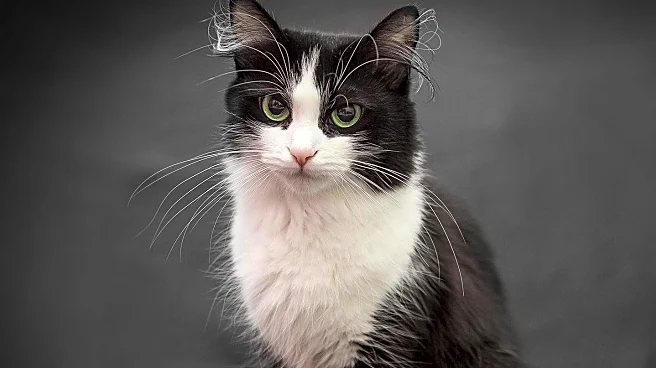What's Happening?
A disabled cat named Rue, who walks on her back legs due to radial hypoplasia, was initially set to be euthanized at an animal clinic in Calgary, Canada. Paget Williams, who worked at the clinic, decided to adopt Rue after realizing the cat could live a happy life despite her disability. Rue's condition causes deformities in her front legs, making them smaller and thinner than normal. Williams took Rue home, initially planning to foster her, but quickly decided to keep her permanently after they bonded. Rue has adapted well to her new environment, getting along with other pets and proving to be agile despite her disability. Williams shared Rue's story on TikTok, where it went viral, receiving positive responses from viewers.
Why It's Important?
The story highlights the importance of giving animals with disabilities a chance at life, challenging the notion that such conditions necessarily lead to poor quality of life. Williams' decision to adopt Rue demonstrates how animals can thrive with proper care and love, regardless of their physical limitations. This narrative can inspire others to consider adopting pets with special needs, potentially reducing euthanasia rates for animals deemed unadoptable. The viral TikTok post also underscores the power of social media in raising awareness and fostering community support for animal welfare causes.
What's Next?
Rue's story may encourage more people to adopt pets with disabilities, leading to increased advocacy for animals with special needs. Animal clinics and shelters might reconsider policies regarding euthanasia for disabled animals, focusing instead on finding suitable homes. Williams' viral TikTok post could continue to garner attention, potentially leading to further media coverage and support for similar cases. Additionally, Rue's journey might inspire educational campaigns about the capabilities and care requirements of disabled pets.
Beyond the Headlines
The ethical considerations surrounding euthanasia for disabled animals are brought to light by Rue's story. It raises questions about the criteria used to determine an animal's quality of life and the role of human intervention in such decisions. The cultural shift towards embracing diversity and inclusivity in all forms, including animal welfare, is reflected in the positive reception of Rue's story. Long-term, this could influence societal attitudes towards disability, promoting acceptance and understanding.









